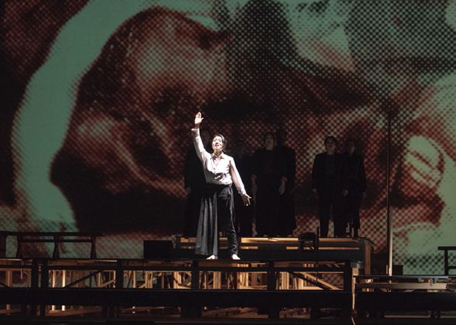DIRECTOR
> THEATRE | MUSICAL THEATRE | OPERA | SPECIAL PROJECTS
Theodora
(2021)
“The heart of the people pierced by the swords of hunger": how Händel's Theodora dialogues with the work of the Argentine feminist theologian Marcella Althaus-Reid.
On the one hand, an oratorio written and composed in the eighteenth century about a woman considered indecent in the fourth century. On the other -and for the same- the oratory of a self-proclaimed indecent Argentine theologian in the 20th and 21st centuries: Theodora by G. F. Händel and the furious and radical word of Marcella Althaus-Reid. Why together? Because in the face of political power and religious officialdom, disobedience was always a structuring feature of certain bodies and not of others; the women's first. And because the martyr life does not recognize centuries. Those who die for a cause, often die just for existing, for indecent with their mere weight the central cause of the world.
As fiction, Theodora shares with the writer's life and work a belief in insubordination; the certainty that there will be no tyranny capable of altering the destiny of those who are born resistant to its flames. The crossing of the piece by the German composer with the written production of the Argentine researcher, who died in Scotland in 2009, marks a journey that goes from the experience of a persecuted Christian to the testimony of a perverted Christian. For Althaus-Reid, per-version is a new way, "a given turn" or a path chosen for "the vital diary". Another version of identity and religion, so that neither of them is as fixed or as skeletal as she imagines and imposes an administration or that Empire. Does pleasure acknowledge its dependence on sacrifice? Do the virginal virtues stop or activate the value inherent in that heavenlyness? Charity and mercy from whom to whom? Sentenced, Theodora bids farewell to this “hypocritical world” and awaits the prize that her hope may give her. Excluded for that same hypocrisy, Marcella orients her work to the academic denunciation of a Catholicism that builds normality, that is, an exterminator of differences. Before and after, the religious authority changes its sign but not its opinion. For the Governor of Antioch, Christianity is a despicable sect. For Althaus-Reid, a historical chapter that you have to sit down to write "without underwear", attentive to Latin American poverty from the 70s onwards and its first victims, women and dissidence.
It is not only because of pain and resurrection as a possibility that Theodora and Marcella coincide in this suprasecular exchange. It is also for the debut of both in Argentina. Never before has the country produced Händel's oratorio and never before has it forcefully trafficked the thought of one of the most rebellious feminists in its recent archives, responsible for an articulation between gender and class that places spirituality at the peak of transformation. A double landing in a present that -according to Marcella- needs sensitivities willing to claim for "the hearts of the people pierced by the swords of hunger". Hunger is always the sacrifice. The sacrifice is always of the same.
Franco Torchia
-
Theodora
Scenic version on Georg Friedrich Händel’s oratorio for one actress, singers and orchestra.
Libretto by Thomas Morell, based in a play by Robert Boyle, premiered in 1750 -
con
Actress
Mercedes Morán -
Theodora
Yun Jung Choi -
Didymus
Martín Oro -
Septimius
Santiago Martínez -
Valens
Víctor Torres -
Irene
Florencia Machado -
Messenger
Iván Maier -
Chistians and Romans
Florencia Burgardt
Daniela Prado
Iván Maier
Mariana Rewerski
Felipe Carelli
Romina Jofré -
Live Camera
Martín Antuña -
Live Serigraphy
Estanislao Moyano -
Assistant on Stage
Esteban Pucheta -
Harpsichord
Benoît Babel -
Orquesta Estable del Teatro Colón
-
Set and Costumes Assistants
Andrea Czarny
Josefina Minond -
Video Assistant
Martín Antuña -
Assistant to the Stage Director
Mariana Ciolfi -
Research and Collaborations in Texts
Franco Torchia -
Video
Oria Pupo
Matías Otalora -
Lights
Rubén Conde -
Set and Costumes
Oria Puppo -
Production
Teatro Colón -
Musical Direction
Johannes Pramsohler -
Dramaturgical Version and Stage Direction
Alejandro Tantanian -
Running Time: 120 minutes
-
Premiere: September 28th, 2021, Teatro Colón, Buenos Aires, Argentina.

The photos are courtesy from Teatro Colón (©Máximo Parpagnoli and Arnaldo Colombaroli) & Diario Clarín